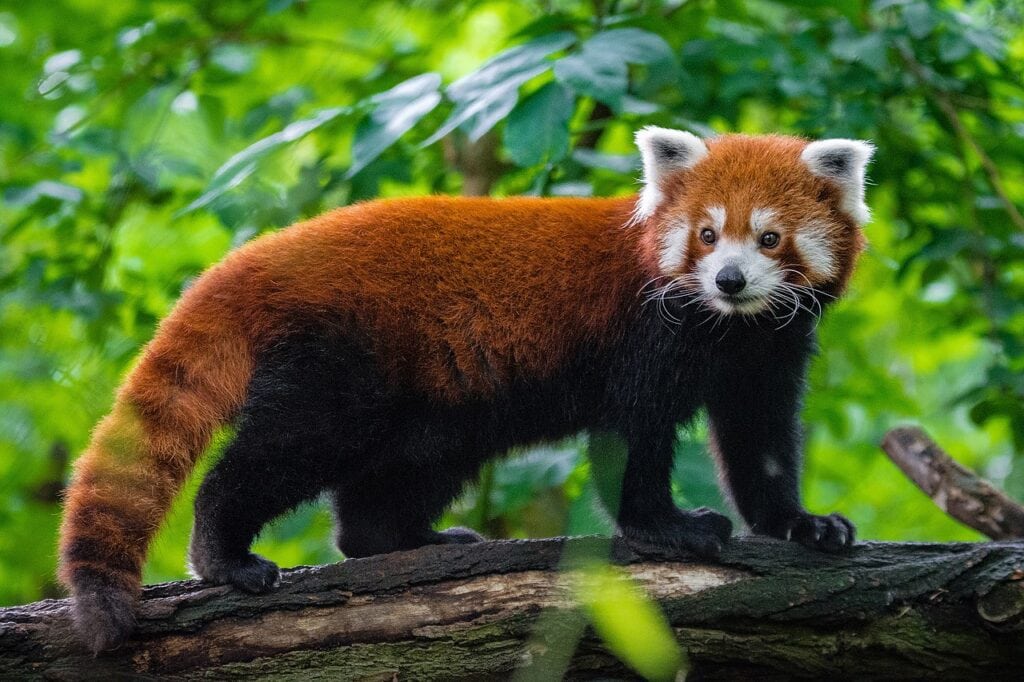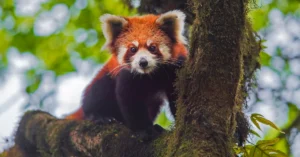
The Red Panda, having its zoological name Ailurus Fulgens, is a Charming Mammal that is native to the Himalayas; largely found on the both side of Himalayan Mountain Ecosystems i.e Indian Side Of Hindukush Himalayas, which includes Nepal, Bhutan and Himal Pradesh’s Siwalik Ranges, Uttarakhand, Sikkim, Darjeeling and Kalimpong Districts of West Bengal, to Arunachal Pradesh; where as on Other side Of South China and Tibetan Region, it is considered an Emblematic Species of Regional Biodiversity.

Red Pandas are an important Component of the Forest Ecosystem, where they play a Crucial Role in maintaining Ecological Balance. In fact, they inhabit temperate forests between 2,200-4,800 feet, above the mean sea level. They are a Small, Arboreal Animal that spends most of its Life in Dense Canopy, Foraging on Bamboo Shoots, Fruits, and Insects. With its distinctive Coat of Reddish-Brown Fur, White Cute Face, and Bushy Tail, the Red Panda is a wonderful Iconic Species that captures the imagination of people worldwide. The Red Panda serves as an important Species for the Conservation of the entire region, which also enables the Conservation Efforts of the other Himalayan Endangered Species such as the Snow Leopard and the Himalayan Musk Deer. Hence, by Protecting the Red Panda, We can Safeguard, not only their Population, but also the Overall Biodiversity of the Region.

Despite its charm, the Red Panda is listed as Endangered on the IUCN Red List of Threatened Species, with a Population estimated to be less than 1,800 in India. The major Threats to their Survival include Loss of Habitat due to Deforestation, Illegal Logging, and Encroachment, as well as hunting for Fur and Pet Trade. Conservation efforts are crucial to safeguard the Red Panda for which the Indian Government, in Collaboration with Local Communities and Conservation Organizations, has been actively engaged in protecting their Natural Habitats, establishing Protected Areas, and Raising awareness about the importance of Conserving this unique Species. Community-based Conservation initiatives, Habitat Restoration, Anti-poaching measures, and Research are among the Conservation Strategies being employed to ensure their Survival.

The Team IISD-CMI team unanimously decided to choose the Red Panda as the Official Mascot of the Global Sustainability Summit (GSS) 2024, because it Symbolizes the urgent need to Protect and Conserve our Natural Heritage for the present and Future Generations. Its Captivating presence and Threatened Status serve as a powerful reminder of the importance of integrating Conservation into Global Agendas. By advocating for Responsible Practices, Supporting Safekeeping efforts, and promoting Sustainable Development, We can work towards a more Sustainable and Resilient future for Our Planet.

Let’s Come together at the Global Sustainability Summit (GSS) 2024 to recognize the Red Panda as a Beacon of Hope for enduring Heritage and take strongest possible actions to Protect this enchanting Species, inspiring Positive Changes for a Better World.
#ProtectTheRedPanda #ConservationMascot #GSS24Official Mascot
Indian Institute of Sustainable Development (IISD) is registered as a National Not-for-Profit, Independent Public Policy Think Tank and Scientific Research Institute at New Delhi, with an objective of working for ensuring overall improvement of lives and living of Common Man, through Research Innovations and engaging with Communities at grass-root level. IISD strives to put India into a Sustainable Path that is Inclusive and Equitable, involving People, Planet and Business.
CMI is an Indian Institute of Sustainable Development (IISD) initiative, which is again a Leading Indian Public Policy Think Tank and Research Institute at New Delhi, committed to protect Our Only Planet, Mother Earth from Global Warming and other adverse impacts of Climate Change. CMI is engaged to evolve a strategic framework for India, in identifying low carbon growth opportunities and facilitates a series of planned and scaled-up program, striving for lowering the carbon intensity of the economy at the macro and sectoral levels, by creating synergies and addressing the barriers, potential trade-offs and appropriate financial (Carbon Finance Models) needs to remove these blockades. Moreover, CMI works to raise India’s consensus efforts and for national preparedness to face and address global climate change adaptation and mitigation challenges.
© 2007-2024 || Indian Institute of Sustainable Development (IISD), New Delhi, India || All Rights Reserved ||